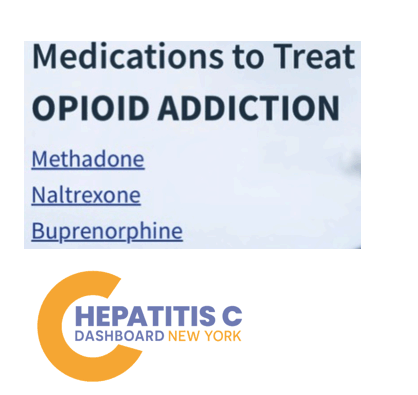| |
NYS Funding for 10 New Outpatient &
Opioid Treatment Programs (OTP)
|
| |
| |
Download the PDF here
NYS Funding for the second cycle of the Learning Collaborative is now available: 10 new outpatient & opioid treatment programs (OTP).

A major key to HCV elimination is HCV services in OTP program (opioid treatment programs). It is not clear how many OTPs provide HCV services and it does appear to not be very good. Here is some data on this below. Any National HCV Elimination Program must make sure HCV services re implemented & funded at all the many OTPs thought the USA. There are 150 in NYS alone and few provide HCV services. They concluded: integration of HIV & HCV services remain suboptimal. An NIH study presented at CROI 2022 examined HIV/HCV testing and treatment availability in SUD treatment facilities that offer MOUD in the US. he analysis was restricted to facilities that offer MOUD (methadone/buprenorphine/naltrexone) and stratified by federal Opioid Treatment Program (OTP) status, with non-OTPs being facilities that only offer buprenorphine/naltrexone...... HCV treatment ranged from 3.9% to 24.7% at various different types of facilities. Screening rates reported ......Integration of HIV and HCV Services with Medication for Opioid Use Disorder in the U.S.
Only 20% of PWID in Baltimore opioid treatment programs (OTPs) received HCV treatment.
Pdf attached
Opioid Treatment Programs (OTPs) provide medication-assisted treatment (MAT) for people diagnosed with an opioid use disorder (OUD). OTPs must be certified by SAMHSA and accredited by an independent, SAMHSA-approved accrediting body.
NYSDOH released a solicitation of interest to fund up to 10 new outpatient and opioid treatment programs to participate in the second cycle of the learning collaborative which will begin on April 1, 2024. Each program will receive $50,000 each year for two years.
To be eligible, applicants must:
• be a not-for-profit 510(c)(3)
• be an OASAS certified outpatient or opioid treatment program and
• have served in 2022 at least 400 outpatient clients or 250 opioid treatment clients.
For details and more information on how to apply, please use the following link:
https://www.healthresearch.org/soi-23-0013-hepatitis-c-hcv-learning-collaborative-for-substance-use-disorder-sud-treatment-programs/.
The New York State Hepatitis C Learning Collaborative for Substance Use Disorder Treatment Programs is a two-year initiative to help programs build capacity to provide onsite HCV testing and linkage to care. The New York State Department of Health (NYSDOH) launched the first cycle of the learning collaborative on April 1, 2022 and is currently funding three outpatient programs and three opioid treatment programs. Click here to read more.
The New York State Department of Health (NYSDOH) launched the first cycle of the learning collaborative on April 1, 2022 and is currently funding three outpatient programs and three opioid treatment programs: Crouse Health Addiction Treatment Services, Horizon Health Services, Huther Doyle Memorial Institute, Lexington Center for Recovery in Valley Cottage, and Poughkeepsie, and UPMC Chautauqua. From September 1, 2022 through September 30, 2023, 68% of the 1,543 newly admitted clients in participating programs received an HCV antibody test. Of those clients tested, 31% had a positive antibody test. Of the clients that had a positive antibody test, 98% received an RNA test, of which 55% (177) were diagnosed with HCV.
Of the 177 clients diagnosed with HCV, 30% were linked to care. Of the 53 clients that were linked to care, 25% started HCV treatment and 62% of those clients completed treatment. Of all clients that completed treatment, 88% were cured.
While highly effective HCV treatment is available, uptake in PWUD and patients on medications for opioid use disorder remains low despite clinical guidelines recommending treatment for all patients. A 2018 survey of the HCV infrastructure in NYS OASAS licensed facilities found most programs do not provide HCV testing onsite and very few offered HCV treatment onsite.
Substance use disorder treatment programs play an important role in the elimination of HCV in NYS, by providing addiction treatment services to thousands of individuals each year. Many people infected with HCV have co-occurring substance use disorders (i.e., injection drug use-IDU). Among new HCV cases reported in 2021, in NYS (excluding NYC), 74% of those with known risk factors indicated injection drug use and 73% indicated other non-injection drug use. The increase in opioid use in NYS has resulted in an increase in the number of new HCV cases reported. Discharge data (2021) from NYS OASAS shows that 47% and 11% of clients discharged from opioid treatment programs and outpatient programs, respectively, were current or former people who inject drugs (PWID).
| |
| |
| |
|
|
|